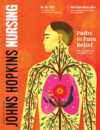Nursing student leader Jarvia Meggett speaks up to empower others.
Written By Steve st. Angelo | Photo by Chris Hartlove
Jarvia Meggett has been a nurse since the second grade in Charleston, SC. Semantics and accreditations aside, she basically entered the world with a plan—cemented by an elementary school career day—that’s brought her all the way to the MSN (Entry into Nursing) Program.
It wasn’t the influence of other nurses in the family (her older sister, now a nurse as well, copied her, Meggett insists). She just knew. And having sprung from “a very, very outspoken family,” her career intentions were established loudly and clearly. After her grandparents died of complications from diabetes, she became determined not just to treat but to prevent such suffering. Later, she became health care proxy to a cousin with breast cancer.
She was an undergrad at the University of South Carolina, then earned a master of public health degree at the University of Michigan and dug in as a researcher, particularly on diabetes. She loved it, but something was missing: “The patient interaction, the relationship building, getting to know patients beyond what I see [on a chart or in the data].” And something was not: “Goodbye to all that snow.”
Hello, Maryland and Johns Hopkins, where she’s found a calling (maternal/doula care via Birth Companions) and reasserted her voice, as president of the Nursing Student Senate.
Her leadership is fueled by an idea she first learned about in Michigan: imposter syndrome. This she describes as diverse individuals brought with good intentions into a system yet remaining outsiders. Meggett had never put a name to the feeling, nor had it stopped her from speaking her mind. But she knows it does keep individuals and organizations from maximizing their potential. So if you can’t find your own voice, maybe hers will do. Meanwhile, she works to build bridges between the Black Student Nurses Association and Asian Pacific American Nursing Student Association, for instance, so that no group feels unembraced.
Her maternal-care focus is likewise driven by inequities. Too many black women die during childbirth because they are not being seen, heard, or trusted to know their own bodies. Possibly because, unlike tennis superstar and millionaire Serena Williams—a fine-tuned athlete—they cannot force the issue.
Meggett is ready to. After earning her MSN, she hopes to become a doctor of nursing practice. DNPs are fixers. And unfairness demands an outspoken response. Even a second grader knows that.

